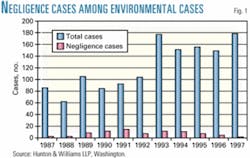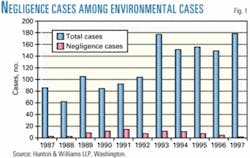Criminal negligence: A prosecutor's perspective
Assistant US Attorney Helen Brunner, one of the prosecutors in the Olympic Pipe Line case and an experienced environmental prosecutor, has commented on some of the pipeline industry's concerns about the nature and effect of criminal enforcement on pipeline security and on safety and accident investigations—and, in particular, the negligence provision of the Clean Water Act.
Brunner's views are her own, reflecting neither those of the US Department of Justice nor of any governmental agency involved in the investigation and prosecution of environmental crimes cases.
Solow: Does the Clean Water Act's criminal negligence provision criminalize accidents in which all due care was thought to have been exercised?
Brunner: This question contains a false premise.
Many situations described as "accidents" have preventable causes. The fact that the individuals whose acts gave rise to the circumstances that cause a release did not intend that a release occur does not end the inquiry.
The question is not whether the consequence was intended but whether the actions that gave rise to the release made it "an accident waiting to happen."
To prove a Clean Water Act criminal negligence violation, the government must prove beyond a reasonable doubt that there was a failure by the defendant to use "reasonable care," a term defined as that amount of care that a reasonably prudent person would use in similar circumstances.
This is not a harsh burden to apply to those who handle potentially dangerous substances.
Thus, where a prosecutor finds that a release is the result of a failure to exercise reasonable care, the case is one that will be considered for criminal prosecution.
Conversely, where a release occurs despite conduct that was reasonable under all of the circumstances, no criminal liability would attach under the Clean Water Act. In that regard, an individual decision may not be viewed in isolation. What may be a reasonable decision in isolation, may not be so when all the circumstances are considered.
Solow: Can criminal sanctions deter accidental behavior?
Brunner: A pure "accident" cannot be deterred because, by definition, it is unexpected, unforeseen, and unintended. What criminal prosecutions can attempt to deter are deliberate decisions that fail to comply with obligations imposed by the law or regulations. That is true whether the ultimate consequences are intended or not.
Regulated businesses generally take reasonable steps to comply voluntarily with their legal obligations. That said, the fundamental purpose of a corporation is to make a profit. There is nothing wrong with that; it is what shareholders and the public expect. This is true no matter how safety conscious a business considers itself.
There will be tension between the need to report on the bottom line and the cost of safety and environmental improvements.
Thus, there can be a need for outside pressure to force attention and resources to safety. Regulations are one approach, but they are only as effective as the enforcement effort that accompanies them.
Enforcement can cause companies to take the steps necessary to prevent the failures and breakdowns that result in problems.
Any conclusion to the contrary ignores a basic fact about the business model.
Solow: Are prosecutors increasing the use of the criminal negligence provision of the CWA?
Brunner: No. This provision has always been used in a few cases in which the facts established liability under this theory and the case is appropriate for criminal prosecution. [Editor's note: see accompanying graph.]
It is also important to note that the negligence provision of the CWA often benefits defendants by giving prosecutors a lesser offense to which defendants can plead guilty.
The criminal negligence provision of the CWA is a misdemeanor; that is, it carries a maximum penalty of 1 year of imprisonment.
Without the provision, the remaining tool for prosecutors is the CWA felony for knowing violation of the act, a provision that carries a maximum term of 3 years' imprisonment.
Solow: Will criminal sanctions for purely accidental behavior stifle cooperation in safety investigations?
Brunner: It is true that where there is a likelihood of criminal prosecution, some individuals may choose not to speak to safety authorities, such as National Transportation Safety Board investigators, without first receiving immunity. Coordination between the NTSB and the prosecutors can address this issue.
It is important to understand, however, that in an investigation into the cause of a pipeline rupture or other event of this type, statements are only one piece of the puzzle.
The documents and forensic analysis of pieces of equipment are equally important.
Solow: Would elimination of the CWA negligence provision make safety investigations easier?
Brunner: Eliminating the Clean Water Act negligence provision would not eliminate criminal investigations of pipeline ruptures or similar events.
While this provision addresses the release to a US water as a result of the rupture, there are also other statutes that have application.
For example, the Hazardous Liquid Pipeline Safety Act has its own criminal provisions. In addition, there are criminal statutes that address false statements to government agencies and obstruction.
In any given situation, there will be a variety of possible criminal penalties that may be applicable, and the government investigating a significant release will consider whether any of these provisions are appropriate.
The availability of the Clean Water Act negligence provision, thus, would not be the catalyst for a government criminal investigation.

